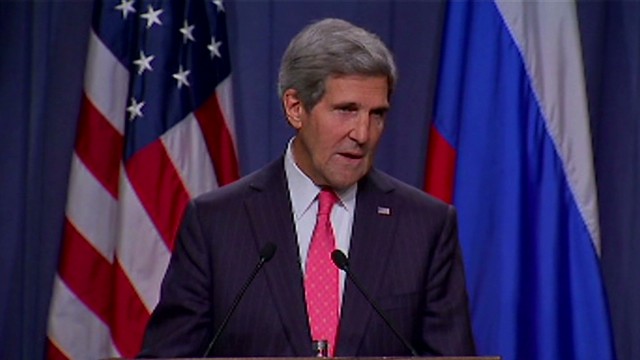Syria's chemical weapons: U.N. expected to release report Monday

The world is expected to learn Monday what really happened the day 1,400 people were allegedly gassed to death outside the Syrian capital of Damascus.
A report by U.N. weapons
inspectors will likely be made public Monday morning, two diplomats told us. The inspectors were sent to to Syria figure out whether a chemical
weapons attack took place on August 21.
But to many, the answer
is a foregone conclusion. Both Syrian rebels and the regime have said
chemical weapons have been used in the bloody civil war. And videos
showing rows of bodies with no apparent injuries and children gasping
for air seem to corroborate both sides' claims.
The most important
question -- who may be responsible -- will go unanswered.
Secretary-General Ban Ki-moon has already said this report will not
assign blame.
The big catalyst
Even thought the August
21 attack resulted in just a fraction of the war's 100,000 deaths, it
has spurred unprecedented action by world leaders.
U.S. President Barack
Obama tried to rally support for targeted strikes on Syria, but later
said he would hold off while diplomatic options play out.
On Saturday, the United
States and Russia reached a rare agreement on Syria. U.S. Secretary of
State John Kerry and Russian Foreign Minister Sergey Lavrov announced a
plan to get Syria to give up its chemical weapons stockpile.
The four-page "Framework for Elimination of Syrian Chemical Weapons" says:
-- Within one week, Syria must submit a full list of its chemical weapons stockpile
-- By November, international inspectors must be on the ground in the country
-- Before the end of November, the inspectors should complete their initial survey of the weapons sites
-- Also before the end of November, all production and mixing or filling equipment must be destroyed
-- By the middle of next year, all chemical weapons material must be destroyed.
The plan now goes to the
U.N. Security Council, where members will try to craft a resolution
that will keep the process under review and allow the U.N. to consider
the use of force or sanctions if Syria fails to comply.
Syria claims 'victory' with plan
Syria's national
reconciliation minister, Ali Haidar, called the framework a "victory"
and thanked Russia for orchestrating a chemical weapons deal to avert
U.S. military action, Russia's state-run RIA Novosti news agency
reported.
Haidar called the deal an achievement of Russian diplomacy and "a victory for Syria won thanks to our Russian friends."
A daunting task
The process of securing
and destroying Syria's cache of chemical weapons -- in the middle of a
civil war -- will be a logistical nightmare.
U.S. intelligence suggests Syria has about 1,000 metric tons of chemical weapons,
most of it sarin and VX stored as unmixed components, U.S. Secretary of
State John Kerry said last week. Sarin and VX are nerve gases that can
cause convulsions, paralysis, respiratory failure or death.
David Kay, a former U.N.
and U.S. weapons inspector, said he thinks it'll take 500 to 1,000
people just to secure the sites. And the stockpile may be stored in some
50 different sites, according to the International Institute for
Counter-Terrorism in Israel.
To complicate matters,
both U.S. officials and Syrian rebels suspect the regime has been moving
around some if its chemical weapons.
"I think we may know
where they were, and we may know where maybe a majority are now. But
look, it's going to be up to the Syrians to disclose where they are and
the amounts that they have," Kay said last week.
So the Syrian regime is basically on the honor system.
Then there's the matter of where the weapons will be taken, and how.
The Russian-U.S. plan
mentioned the possibility of collecting and destroying them in the
coastal area of Syria, which is under government control. But who would
protect the convoys headed there? Will the regime fully cooperate? And
will rebels agree to a ceasefire as the weapons are being moved?
The U.S. and Russia say they're working on the details. They say they'll submit something in the next few days.
The destruction process will be carried out by personnel from both the United Nations and the Organisation for the Prohibition of Chemical Weapons, which implements the international ban on chemical weapons use, according to Kerry-Lavrov plan.
Syria's not off the hook
for possible military attack. Both Obama and French President Francois
Hollande have said military force must still be an option if the
diplomacy route fails.
Syria's government has denied using chemical weapons, saying instead that rebels used poison gas on its forces.
But in a report issued last week, Human Rights Watch said al-Assad's forces "were almost certainly responsible," citing photos and videos from the attack scene that pointed to weapons not known to be in rebel hands.
Opposition group wants more
Even if Syria's chemical weapons disappear, that won't stop the daily bloodshed on the ground, opposition activists say.
"The Syrian National
Coalition insists that the ban of use of chemical weapons, which led to
the loss of lives of more than 1,400 Syrian civilians, must be extended
to ban the use of the regime air power and ballistic weapons against
population centers," the opposition group said in a statement.
"The world must not
allow the Assad regime to take advantage of the Russian initiative and
their joining the treaty on the prohibition of the use of chemical
weapons as an excuse to continue the daily slaughter of the Syrian
people with impunity."






0 comments:
Post a Comment